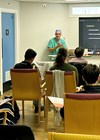The importance of minimising human error in surgery is well established. This was initially sparked by lessons learned from the aviation industry in the 1970s after several fatal flight accidents [1]. This became a catalyst for a movement on training surgical teams on managing human factors.
In any heightened situation in the operating room, such as an unexpected complication, the judgement of the operating ophthalmologist and the functioning of the surgical team becomes crucial. The outcome for patients with posterior capsular rupture is dependent on effective complication management. For ophthalmology trainees, the steep learning curve of cataract surgery can also present many a stressful situation while we navigate various challenges, from the ST1 starting their first steps to the more senior trainee tackling more challenging cases and managing complications.
Competence in non-technical skills now form an essential part of the curricula in most surgical specialities. However, the tools used to assess surgical team behaviours are not widely applied to ophthalmology. These factors are broadly categorised into situational awareness, communication & teamwork, decision making and leadership [2].
Effective teamwork sets you up for a smooth and safe operating list, and communication is integral to this. Within the surgical team this can be variable, but we should consider what influences the quality of our exchanges with our colleagues and patients. Ensuring a message is heard by having it repeated back is a popular method used in the aviation and surgical setting, known as ‘closed loop communication’ [1]. Having a culture where team members feel they can speak up about concerns is also important. Furthermore, in the current climate of COVID-19, operating while donning the extra garb of personal protective equipment adds an extra barrier to being heard and seen by our team members.
Personal and environmental factors can both contribute to human error. Picture this. You have arrived late to theatre from a busy clinic having wolfed down your lunch along the way, a scenario which inevitably has happened to all of us. Your stress level – not to mention blood pressure – is high before you even begin. Personal factors start with basic human needs. Mistakes are more likely when we are hungry, angry, late,or tired (summed up by the mnemonic HALT [3]). Tiredness affects motor skills, decision making and situational awareness [1]. Situational awareness degrades when concentrating for long periods. Taking a break at an appropriate time could save you trouble later. Underlying emotions can resurface at any time and this can manifest in situations of mental overload. During a difficult surgical procedure this increases our propensity to make mistakes. Stepping back and re-evaluating the situation helps us gather our thoughts and find different approaches to solve a problem.
A well organised theatre is key to the smooth running of a list. Having a trainee run around to complete multiple tasks just before they are due to operate can add to stress levels. Another factor may be the relationship between the trainee and the supervising consultant. Anecdotally, trainees have found that when in theatre with a consultant they are already familiar with, particularly those who have faith in their junior’s ability, it is naturally easier to hone their surgical skills in this supportive environment. This is especially true for a novice surgeon in training. Significant stress has been shown to negatively impact surgical training [4]. Furthermore, the absence of stressful conditions has been shown to accelerate dextrous skill acquisition in surgery [5].
We must be more conscious of our own triggers for feeling pressure at work, whether it is personal or environmental factors including time constraints, targets from management or a cumbersome computer system. Another recurring theme is the conflicting priorities between training and service provision. COVID-19 has stunted the progression of surgical training, and the lack of cataract surgery training was the concern most often raised by UK ophthalmology trainees in the wake of the pandemic [6]. As we increase the capacity of theatre lists, trainees are acutely aware of the pressure to catch up their surgical competencies in time for training progression.
Whatever the stage of career, are you aware of your state of mind when you enter the operating room? To become a doctor, you must already have some degree of discipline. Exams have required repeatedly restraining from the myriad of distractions to bring the attention back to the books, but what about in our day-to-day clinical work? We start our day by physically getting ready, but do we mentally prepare before an important task? Underneath the hierarchy of the workplace, we are all only human. One must ask, how do we react to mounting challenges throughout the day? How much do the moods of others affect our own?
Mindfulness-based cognitive training to support surgical residents in the USA has shown potential benefits to executive function and performance [7]. In an age of wellbeing and mindfulness, particularly while navigating through the chaos that a day in the NHS can bring, we should regularly ask ourselves, what is it that helps de-clutter the noise of our thoughts? Whether you like the Eastern approach of yoga or meditation, journaling or something as simple as a walk outside, we would be wise to regularly attend to our wellbeing, as well as our clinical acumen. Let us keep in mind the human factors that affect our performance in theatre. In these strange times we must remember that only by taking care of ourselves first are we able to provide the best care for our patients. We would be wise to take the opportunity to know ourselves a little better and increase our understanding of others, in other words, tend to our minds.
References
1. Brennan P, Morris S. Human factors – they don’t apply to surgeons, right? The Bulletin of the Royal College of Surgeons of England 2019;101:8-11.
2. Mitchell L, Flin R (eds): Safer Surgery: Analysing Behaviour in the Operating Theatre. CRC Press; 2009.
3. Ragau S, Hitchcock R, Craft J, Christensen M. Using the HALT model in an exploratory quality improvement initiative to reduce medication errors. Br J Nurs 2018;27:1330-5.
4. Arora S, Sevdalis N, Aggarwal R, et al. Stress impairs psychomotor performance in novice laparoscopic surgeons. Surg Endosc 2010;24(10):2588-93.
5. Pavlidis I, Zavlin D, Khatri AR, et al. Absence of stressful conditions accelerates dexterous skill acquisition in surgery. Sci Rep 2019;9(1):1747.
6. Hussain R, Singh B, Shah N, et al. Impact of COVID-19 on ophthalmic specialist training in the United Kingdom – the trainees’ perspective. Eye 2020;34:2157–60.
7. Lebares CC, Guvva EV, Olaru M, et al. Efficacy of mindfulness-based cognitive training in surgery: additional analysis of the mindful surgeon pilot randomized clinical trial. JAMA Netw Open 2019;2(5):e194108.
COMMENTS ARE WELCOME








